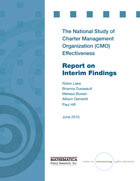Charter management organizations (CMOs), nonprofit entities that directly manage public charter schools, are a significant force in today’s public K–12 charter school landscape. The CMO model is meant to meld the benefits of school districts—including economies of scale, collaboration among similar schools, and support structures—with the autonomies and entrepreneurial drive of the charter sector.
In the late 1990s and early 2000s, the major philanthropies funding charter schools invested heavily in CMOs and similar organizations. Their investments in CMO growth have been targeted to specific urban school districts that have been considered difficult, if not impossible, to reform. In more recent years, the strong reputations of CMOs some cities have led many policy leaders to call for greater replication of high-performing charter schools via CMOs, especially as a strategy for turning around or replacing chronically low-performing public schools.
The National Study of Charter Management Organization Effectiveness was designed to better understand which practices and contextual factors are associated with CMO impacts. This interim report explores how CMOs vary according to their theories of action, structural organization, and growth strategies and delves into the ongoing organizational and financial challenges that CMOs face. The final report, released in January of 2012, reported on CMO outcomes.






